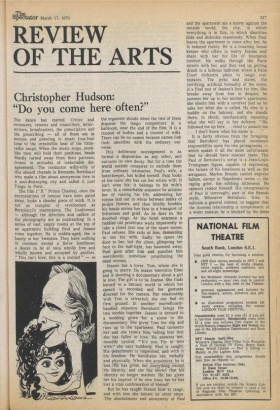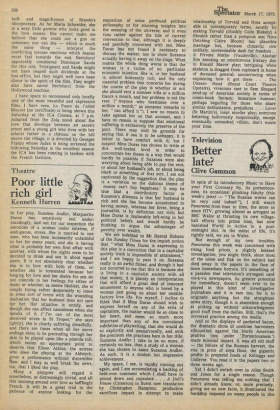Christopher Hudson: "Do you come here often?
The dance has started. Critics and reviewers, censors and councillors, letterwriters, broadcasters, the prescriptive and the proscribing — all of them set in motion and prancing in smart four-four time to the irresistible beat of the tittletattle tango. When the music stops, storklike they will hold their positions, heads fixedly turned away from their partners, frozen in attitudes of ineluctable disagreement. The conductor willy-nilly of this absurd charade is Bernardo Bertolucci who made a film about anonymous love in a soul-destroying city and called it Last Tango in Paris.
The film (" X " Prince Charles), once the encrustations of rumour have been pared away, looks a slender piece of work. It is not as complex or reverberant as I3ertolucci's masterpiece The Conformist — although the direction and calibre of the photography are as outstanding. In a series of vast, empty rooms at the top of an apartment building Paul and Jeanne come together. He is middle-aged,; she is barely in her 'twenties. They have nothing in common except a fierce loneliness; a desire to be at once wholly free and wholly known and accepted by another. "This isn't love; this is a contest " — as the organiser shouts when the two of them disperse the tango competitors in a ballroom, near the end of the film. It is a contest of bodies and a contest of wills. There can be no names because names link Cneir identities with the ordinary universe.
This deliberate estrangement is as formal a disposition as any other, and nuri.ures its own decay. But for a time the world outside conspires to exclude them from ordinary intimacies. Paul's wife, a hotel-keeper, has killed herself. Paul looks at the razor she has cut her wrists with. It isn't even his; it belongs to his wife's lover. In a remarkable sequence he accuses her of ruining his life, addressing her corpse laid out in white between banks of purple flowers, and then blindly fumbles his hands across her face in a transport of bitterness and grief. As he does so, the doorbell rings. At the hotel entrance a raddled old prostitute waits impatiently to take a client into one of the spare rooms. Paul refuses. She rails at him, demanding to see his wife. Sadly he opens the door to her, but the client, glimpsing her face in the half-light, has hastened away.
Paul goes after him and punches him mercilessly, somehow propitiating the dead woman.
Jeanne has a lover, Tom, whom she is going to marry. He makes television films and is shooting a documentary about a girl in love. The girl is to be Jeanne. She finds herself in a fantasy world in which her speech is recorded, and her gestures directed for the camera. Her relationship with Tom is refracted; she can find no firm ground. In another marvellously handled sequence Bertolucci brings the two worlds together. Jeanne is dressed in a wedding gown for a scene in the documentary. She gives Tom the slip and runs up to the apartment. Paul torments her and she taunts him, telling him that she has fallen in love. He answers her, moodily cynical. It's you I'm in love with," she says suddenly. Paul is caught. His detachment is imperilled, and with it his freedom. He humiliates her, verbally and physically. When she acquiesces, he is lost. He has given her everything except his identity, and she has shown that his identity no longer matters. He has given her his imprint: if he now loses her he has lost a vital confirmation of himself.
But he has taught Jeanne how to tango, and with him she knows no other steps. The absoluteness and anonymity of Paul 337 and the apartment are a surety against the outside world, the city, in which everything is in flux, in which identities slide and dislocate ceaselessly. When Paul leaves the apartment to come after her, he is reduced visibly. He is a boarding house keeper who offers to marry Jeanne and share with her his life of bourgeois comfort. He walks through the Paris streets with her, and they end up getting drunk in a hideous ballroom where a Palm Court orchestra plays to tango contestants. The jerks and stares, the terrifying, artificial formality of the scene, is a final test of Jeanne's love for him. She breaks away from him in despair; he pursues her up to her mother's apartment; she shoots him with a revolver just as he asks her what she is called. He dies in a huddle on the balcony, and she stands there, in shock, mechanically repeating what she will say in her defence: " He followed me up here . . . tried to assault me . . . I don't know what his name is It is fairly obvious from the foregoing that Bertolucci has placed enormous responsibility upon his two protagonists — which makes it all the more unfortunate that he should have miscast them. The Paul of Bertolucci's script is a Jean-Louis Trintignant figure, capable of expressing the failure of his loneliness as well as the arrogance. Marlon Brando cannot express failure, except in Napoleonic terms — the raging grief, the sobbing bitterness. He cannnot reduce himself. His interpretation of Paul is inwrought, part of the Brand° myth. Whenever Bertolucci tries to indicate a general context, to suggest that the doomed relationship is symptomatic of a wider malaise, he is blocked by the sheer
bulk and magnificence of Brando's idiosyncrasy. As for Maria Schneider, she is a sexy little gamine who looks good in the love scenes. She cannot make me believe that she could use a gun on someone; nor can she — which is much the same thing — interpret the conflicting intense emotions which Jeanne must feel towards the end. Bertolucci apparently considered Dominque Sanda for this role. Trintignant and Sanda might not have reaped such dividends at the box-office, but they might well have been closer to the spirit of the film. They might also have saved Bertolucci from the Hollywood machine.
I have space to recommend only briefly one of the most beautiful and expressive films I have seen. La Faute de l'Abbe Mou ref (no certificate) is being shown this Saturday at the ICA Cinema, at 7 p.m. Adapted from the Zola novel about the love that develops between an ascetic priest and a young girl who lives with her atheist father in a château on the hill above the village, it is directed by Georges Franju whose Judex is being screened the folic wing Saturday in the excellent season the ICA has been running in tandem with the French Institute.



































 Previous page
Previous page